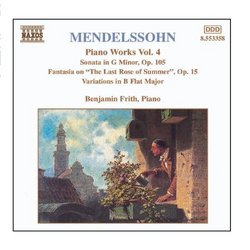Some incredible pieces from Mendelssohn
Hexameron | 02/11/2007
(4 out of 5 stars)
"The previous three volumes in this Mendelssohn Piano series have proven to be consistent in quality. While there is nothing in these piano works that stand out above those of his contemporaries, Mendelssohn's fluency with charming melodies and his intelligent Classicism and sophisticated passion are collectively enough to earn these CD's a continuous rating of 4 stars. Each recording in this series has usually had at least one or two excellent works in the midst of some average ones. Volume 4 contains a few incredible pieces from Mendelssohn. One of them is actually the most moving work I've ever heard from Mendelssohn. With the exception of this, the majority of pieces here are light and melodious. Don't expect Beethovian depth, Lisztian flare or Chopinesque beauty.
Perhaps the most amiable and enduring work on this disc is the wonderful but mysterious Sonata in G minor Op. 105. This is another posthumous sonata which a young Mendelssohn actually played to a much delighted Goethe. The first movement is undeniably Classical; you could mistake this for a movement from Dussek or Haydn. This allegro movement is a whopping 9 minutes of pure fancy and mirth; the musical themes are innocent and wholly pleasant. The second movement, though, is perhaps the most profound piece of music on this recording. I could mistake this for an early slow movement of Beethoven or Ries. The modulations and the dominant tension are completely in the style of Beethoven. The heaviness and sudden jarring of these dominant bass chords are so uncharacteristic of Mendelssohn. I'm perplexed why Keith Anderson, the notes writer, was not incredulous about this grave movement. If this was written when Mendelssohn was 12, it deserves more than a mere "shows greater freedom" exegesis. This music is astoundingly mature and dramatic; it's one of the greatest slow movements I've heard from Mendelssohn, instantly challenging the distinction of his Songs Without Words. Oddly, the last movement abandons the sublime quality of music found in the adagio and chooses to be a typical vigorous and joyful Classical Finale. There is nothing too remarkable about it; it's pretty and sparkly. But with respect to the above-average first movement, it seems like Mendelssohn sandwiched one of his most powerful inspirations of a slow movement with two frivolous Haydnesque romps. It's a strange fate for such a beautiful and serious piece of music, especially when written by a child; a depressed twenty year old Beethoven might have sketched something like this.
Mendelssohn's Fantasia on "The Last Rose of Summer" is akin to most of his Caprices. We as listeners might even be able to imagine how Mendelssohn improvised from listening to this fantasia; it illustrates his prodigious talent for variation. Although the theme of this "Last Rose of Summer" song is not that memorable, Mendelssohn explores tender and reflective emotions with his departures and alterations. A nice contrast to this predominantly quiet music is his turbulent Etude in F minor, written for Ignaz Moscheles and published in the Methode des methodes, which featured etudes from virtuosi like Chopin and Liszt. It's all too brief but still a splendid display of drama in the style of Chopin. The Op. 118 Capriccio is not that appealing in the beginning; it's in the central section and towards the end where the intensity manages to grab my attention. Other than that, I don't think it's that impressive. The Zwei Klavierstucke or "Two Pieces" were rather disappointing, as well. The first was placid and unmoving. The only redeeming aspect was found in the second Presto agitato piece which showcased some interesting usage of arpeggios. It also emphasized a recurring dominant chord as part of the thematic material, which provided some much-needed suspense.
The last two pieces on this disc are dignified and energetic. The Variations Op. 83 are not as magnificent as his Variations serieuses, but Mendelssohn is always surprising with his ideas for variations. While the theme is somewhat bland, Mendelssohn's precocious abilities to embellish and add new harmonization's to the themes are always well-done. Lastly, the Scherzo a capriccio in F Sharp minor is peculiarly virtuosic and even bombastic. It is tinged with whimsical moments but it also ventures into occasional melancholy. Ultimately, the Scherzo theme takes over and builds up into a fiery demonic force whose volition is unpredictable. Musically, this is better than his Variations and some of his other Caprices. Mendelssohn finally unleashes some fire and lets the propulsion of the rhythmic energy take over and discharge an arousing ending before dying into silence.
Bottom line: Although there are some works here that may only garner one listening, I must strongly emphasize the worth of the Sonata Op. 105, specifically the adagio movement. I don't know how Mendelssohn could have composed this at 12 and then write the rest of these sprightly works when he was in his 20s. It is one of the darkest movements of music I've heard from Mendelssohn. The Etude in F minor and the Scherzo a Capriccio showcase Mendelssohn's fireworks, but the rest are mediocre; pleasant but not unique. I implore the curious to get this CD, though, if only for the Sonata in G minor. That second movement is a mysterious inspiration that needs to be heard."
Dishonest
Canzone | California | 05/26/2010
(1 out of 5 stars)
"By claiming you get the original "art work" etc., Amazon implies that this is the same product that Naxos offered. It is not. There are no liner notes, but nowhere does Amazon state that fact. Naxos has achieved a considerable reputation for offering good recordings at a reasonable price (and this was one of them); it is sad they it has chosen to cheapen that reputation by agreeing to unethical merchandising practices. I expected better from both companies."


 Track Listings (10) - Disc #1
Track Listings (10) - Disc #1